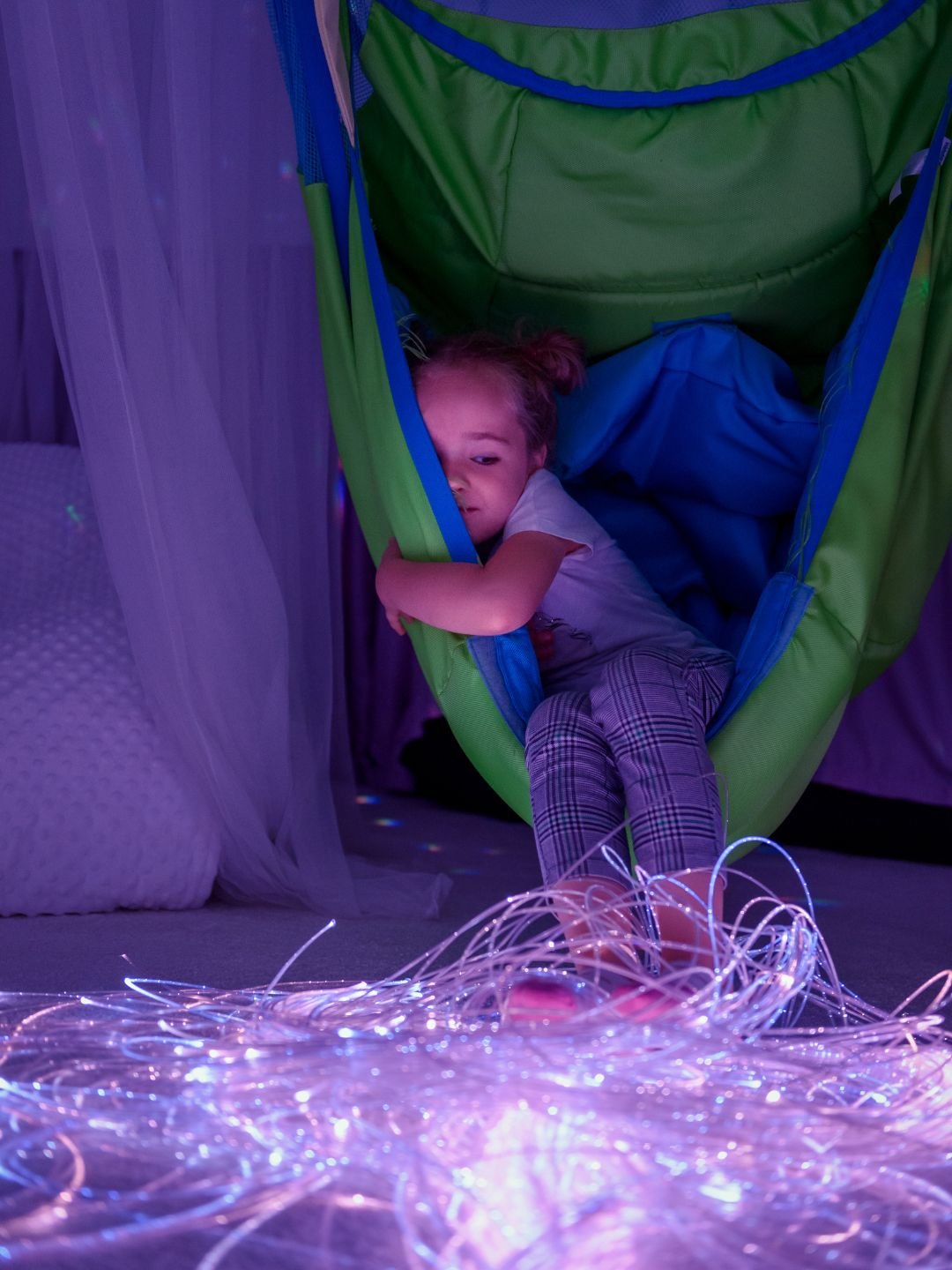Play Therapy Supports the Mental Health of Autistic Children with Sensory Issues
Children with Autism Spectrum Disorder may experience sensory processing differences that impact their daily lives. Sensory issues can manifest in various ways, including hypersensitivity or hypo-sensitivity to certain stimuli or sensory-seeking behaviors. These differences can affect how a child experiences the world around them, including touch, sound, smell, taste, and visual stimuli. It is important to recognize that sensory differences are a natural part of human neurodiversity and should be respected and accommodated rather than pathologized or treated as a problem to be fixed. By creating sensory-friendly environments, providing accommodations, and teaching coping strategies, Autistic children can thrive and participate fully in all aspects of life.
Navigating sensory experiences can be exhausting and overwhelming for children with Autism. This can lead to Autistic children experiencing mental health issues.
How sensory issues impact the mental health of children with Autism
Anxiety
Sensory issues can significantly impact the mental health and well-being of children with Autism Spectrum Disorder leading to increased anxiety and stress. For many Autistic children, sensory experiences can be overwhelming and unpredictable, resulting in fear, panic, or a sense of being out of control. This anxiety can impact their ability to participate in activities and socialize with peers.
Overwhelm
Autistic children who are hypersensitive to sensory stimuli may become overwhelmed when there is a lot of sensory input. This can lead to meltdowns or shutdowns where the child becomes emotionally dysregulated and unable to participate in activities or interact with others.
Avoidance
Children with Autism who are hypersensitive to sensory stimuli may learn to avoid situations where they are exposed to these stimuli. For example, a child who is hypersensitive to touch may avoid hugs or physical contact with others. This avoidance can lead to social isolation and avoidance of certain activities.
LOW SELF-ESTEEM
Autistic children who struggle with sensory issues may feel different from their peers and may struggle with participating in activities that are important to them. This can impact their self-esteem and lead to feelings of loneliness and isolation.
Benefits of Play Therapy for Autistic Children with Sensory Issues
Play Therapy can be an effective intervention for addressing sensory issues in children with Autism and improving their mental health.
Below are some of the benefits of Play therapy for Autistic children with sensory issues.
Play Therapy Provides a Safe and Structured Environment
Play therapy provides a safe and structured environment where children with Autism can feel comfortable exploring their emotions and behaviors. The Play Therapist provides a safe space for the child to play and express themselves without fear of judgment or criticism.
Play Therapy uses play as a form of communication
Play Therapy uses play as a means of communication between the therapist and the child. This is particularly beneficial for children with Autism who may have difficulty communicating verbally. Play Therapy allows children to express their thoughts and feelings through play.
Play Therapy Supports sensory integration
Play therapy can help Autistic children learn to regulate their sensory processing. The child therapist can use sensory-based activities to help the child learn to process sensory information in a more effective way. The child is provided with the opportunity to experience different sensory inputs in a safe and supportive environment.
Play Therapy encourages emotional regulation
Play Therapy can help children with Autism learn how to regulate their emotions. The child therapist can use play to help the child learn to identify and express their emotions in a healthy way.
Play Therapy decreases anxiety
In play therapy, the child therapist can use a variety of sensory materials and activities to create a calming and engaging environment for the child. For example, a Play Therapist may use tactile materials such as sand or playdough to help the child regulate their sensory input and reduce anxiety. The therapist may also incorporate soothing sounds or aromas to create a calming sensory experience for the child.
Through Play Therapy, the child can learn coping strategies to manage their anxiety when they encounter overwhelming sensory stimuli in their daily lives. For example, the Play Therapist may teach the child breathing techniques or other relaxation strategies to use when they feel anxious or overwhelmed.
Play therapy improves self-esteem
Play Therapy can improve the self-esteem of children with Autism. It can provide opportunities for the child to develop new skills or build on existing ones. This can help the child feel competent and successful, which can increase their self-esteem.
In conclusion, Play Therapy can be a highly effective way to address sensory issues in children with Autism and support their mental health. Play Therapy can help children with Autism develop coping strategies and improve their ability to manage their sensory experiences. Play Therapy has been proven to be a valuable tool in helping children with Autism learn to regulate their emotions, manage their anxiety, and increase their self-esteem. By working with a Play Therapist, children can develop the skills they need to navigate their sensory challenges and build the confidence they need to succeed.
Janine Kelly, MSW, LCSW, RPT, CATP, ADHD-CCSP, CCATP-CA is a Registered Play Therapist, Certified EMDR Therapist, and Perinatal Mental Health Therapist in Middlesex, NJ. Janine specializes in childhood anxiety, childhood OCD, childhood trauma, and supporting children who experience neurodivergence such as ADHD and Autism. She also specializes in pregnancy and postpartum mood disorders such as anxiety, panic disorder, OCD, depression, and Post-traumatic Stress Disorder (PTSD).
*This blog is not a substitute for therapy. To schedule an appointment, please click below.





